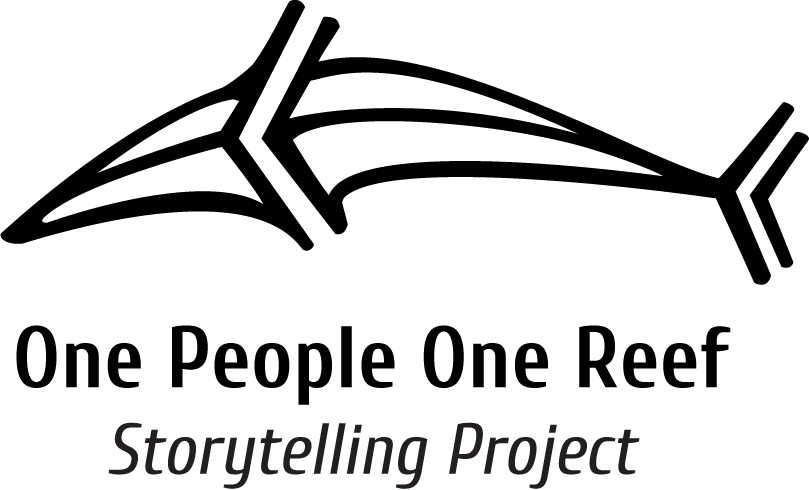Foreword
Maggie Tadog of Fedrai Island shared these words with her listeners as a preface to telling the story Loaroab – the fifth story in this collection. This kind of opening lecture is a traditional part of storytelling, and Maggie’s words here capture the motivation for this project.
Ulithian
Iwe ible kapta nglaugmi tot hapatpat ngo isa yewali ngalugmi sew fiyaong, fiyaongol mwuswe. Taepoel wol meka fulyach ralkawe irel yach bubudoh.
Iwe ngo sangengal yach ma medfa igli foarmel. Ye kael hasorow wol mekae fulyach bo mil mala wuluetig le fofolayu layiur yaelwich. Ted ifa lepal meka mil skuun le ye mel irech. Iwe be lefhaf yodkla wulitigich rema foloayu giich. Sibe teyfengal, sibe momongoy, ngoa yir reble foloay ngal giich. Reble hamadfa giich irel kofal semat mo semat faormel. Taepoel mekae be iye sengal ilae be iye sengal yami faoru ilae ngoa hami habe medfagili faormel.
Hasorow ilae sew faormel le paeling paeling pelael wol mekae fulyach. Sibe hasorowur yarmat, si hasrowu fuluy, si hasrowu wulitigich, mo setaer mo setaer yarmat. Semat yarmat ngo muslaog wululul yach hapatpat ngalir. Yarmatla te yach taer, muslaoh yach hapatpat ngali yarmetla ye wachich mo ifach, ngo muslaog yach hapatpat ngal metla ye maal mo imoach. Sa l’ol’oag l’ol’oag ye la holar tamwol irel lepal wululul hasorow. Setaer mo setaer yarmat ngoa mwuslaog wululul yach hapatpat ngalir. Giich si medaf bo wulitigich rema kaengalgich mekae (ngo) giich siyae foefeoru. Ngo siy kaay mo iyang.
Sichap mo lebogtach siyae l’ol’oah. Si hasorowu mekawe wuliutigich; selach mo temach. Hare giich si yaelwich sibe hasrowu mekawe bisich we repaeling mimach. Ilaeng gich sibe kaay mirel imach sibe gula wululul sible loloag le sibe daw taeng imach ngo yechap hasrow mo irel yimach sa loloag. Ikla re maal taeng giich musloag yach hapatpat ngalir, si hasrowur. Ye ilae sengal wululul.
Be lefhaf ilaeng resa foloay. Ye chaep mirel mekla siya bidah bidah hasigsig ye silae hola moeloe kaptal ririy. Pangal mekawe ngoa wuliutigich rema foloayu ngal giich. Yemedaf yarmat ralkawe. Ye kaael hasorow ralkawe milmala yarmat re medaf ngo re kamadafa mekae siya budoh budoh ye silae hola mekae igla be chil yaelwich choeg semael saloag skuun.
Tay laap time le rebe mel irel wulitigir le rebe hapatpat ngalir. Iwe ilae mele sa budoh mekae yach taey ma medfa igili faormel. Ilae mo moeloe ye iyesengal ngo giich sibe yedmaegil bo lepal sugfed le semal ye kangalgiich le si taelngae ngo ye momai ngoa siyae hasi boa repiyach. Ilae ngo ilae mo te wulitigich ngo semael yarmat le ye malili ngal gich le momai moeloe ye soer ngoa siyae hasi. Ilala sew moeloe rema soer bo wisdom mala hobe hataleng ngal pangal faormel sew repiy le ye momay boa yor taram irel mala hobe hataram ngalpangal faormel. Tetugil hare semael yaelwich ngo ye momai moeloe ye kaengalug ngo ye yaelwich mo ifam ngo gel hobe hataeleng ngali bo sew repi. Gel hobe kay repi mo iyang. Ilae ye ilae sengal mala wululul yach memeldoh.
English
So, I will share with you a few words of wisdom before I tell you a story of the past.
In the past, we used to share our knowledge of our atolls and how we value such knowledge. Respect is essential within our island communities, because parents continue to tutor children. Back then there was little to no western schooling like we have here now. So, with each evening meal, parents would educate us at home. They would patiently take time and explain the importance of learning the many different aspects of life, and the crucial wisdom and understanding of everything.
Humility is a huge quality of peaceful existence. We learn to respect the community, the land, and people of every age group. There is an appropriate way to address your peers, your elders, and the chiefs. This is how we gain knowledge (learn) and develop wisdom (understand). We learn most when our parents never stop teaching and when we continue to obey. Learning starts from within our homes and continues out into our community. We start by learning simple things like the proper way to address people and eventually advance to lessons on things such as how to have a successful marriage. People used to be wiser because respect was a key ingredient of learning, and we continued to nurture such wisdom in our daily lives.
Today we have entered an era in which our young children have started to leave home for Western schooling. More and more children are missing out on the traditional ways of learning from their parents. I believe this lack of quality time spent with parents has led to our generation’s lack of traditional knowledge and understanding.
Nevertheless, our plea is not to give up easily. Especially when this is the reality of our time. We must strive for any slight wisdom that anybody shares with us, regardless of the source. Even if the person sharing is not your biological parent or is a younger peer, if we see that what they are sharing is of value, we must listen and adopt that knowledge. Listening is a fundamental skill, and you will benefit by learning about how we survive on these islands.

